In central Ukraine’s Cherkasy region, there is a small town of Uman that has sheltered many internally displaced persons since Russia’s large-scale invasion. Thousands of kilometers away, in southern France lives a former journalist with Agence France Presse, who once served as the agency’s chief editor, Denis Hiault. A string of events has firmly tied this man with the Ukrainian town, and the main driver was Russia’s brutal war of aggression. Denis is now a volunteer who runs a SOS-Ouman fundraiser who just completed his eighth humanitarian mission to Ukraine, delivering along with his team tonnes of medical supplies and other necessities to Uman’s medics, teachers, and others in need of help. Ukrinform spoke with the ex-journalist during his short stop in Kyiv’s Maidan Square as he was heading south, to the town where he found many new friends and which always embraces him with gratitude whenever he arrives with yet another humanitarian cargo batch.
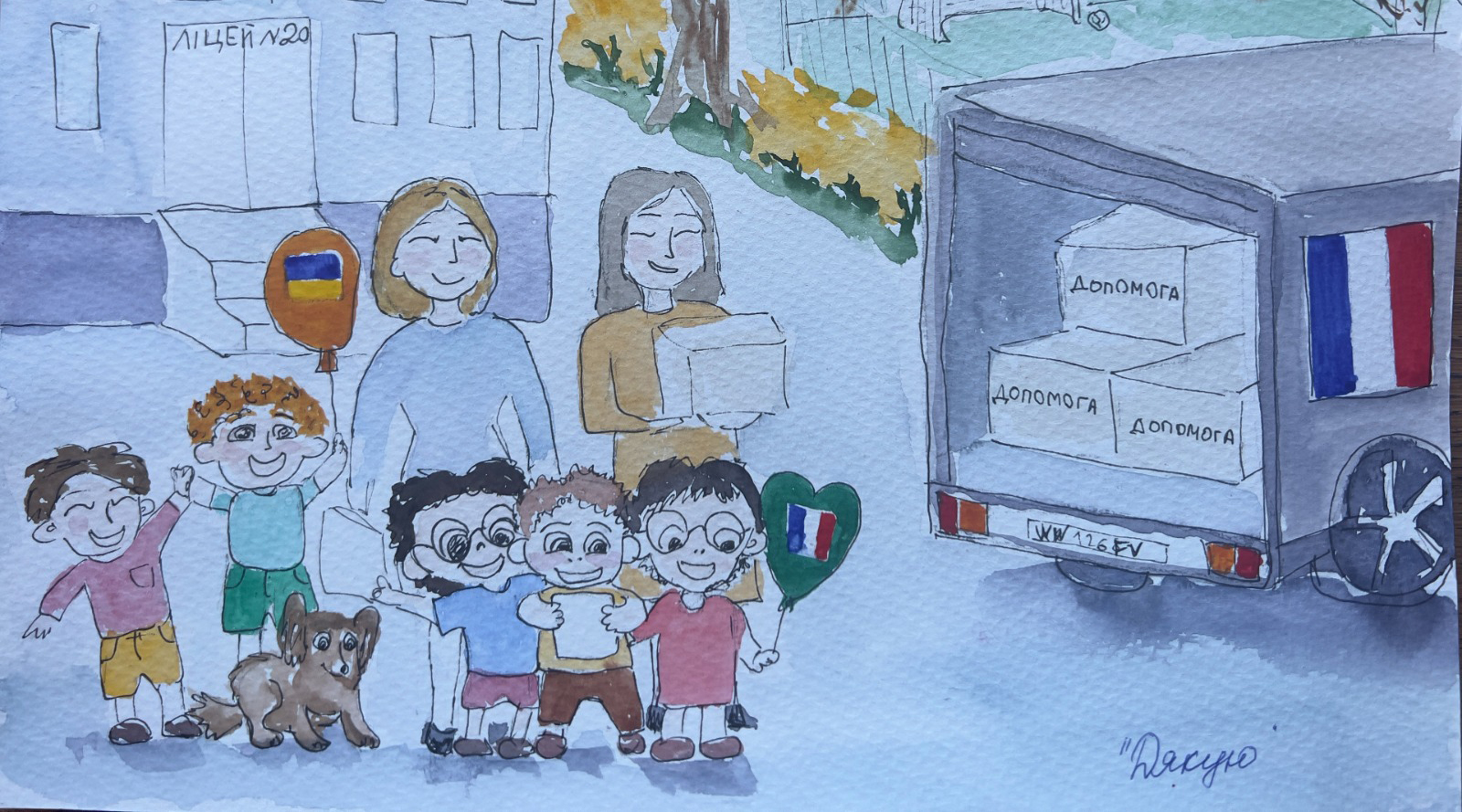
HOSPITALS ARE OUR MAIN DONORS
- Denis, first of all, why Uman? Of all places, you chose this particular town to provide humanitarian assistance to?
- Well, in fact, my former colleague Nicolas Miletitch, with whom I co-founded our humanitarian association SOS-Ouman in France, is married to a Russian woman, Katia Anapolskaya, who leads a choir in Paris that brings together Ukrainian and Russian singers. One of them, who has family in Uman, suggested that we concentrate our efforts on this particular town that is seen as a crossroads for internally displaced persons.
What we learned is that Uman has about 90,000 residents in Uman but they received tens of thousands of IDPs there. So once we started to travel there, we built some local. We deliver aid ourselves. We want to go and see these people, we want to make sure that we deliver what they need, what their priorities are, and also to make sure that our aid goes to the right people.
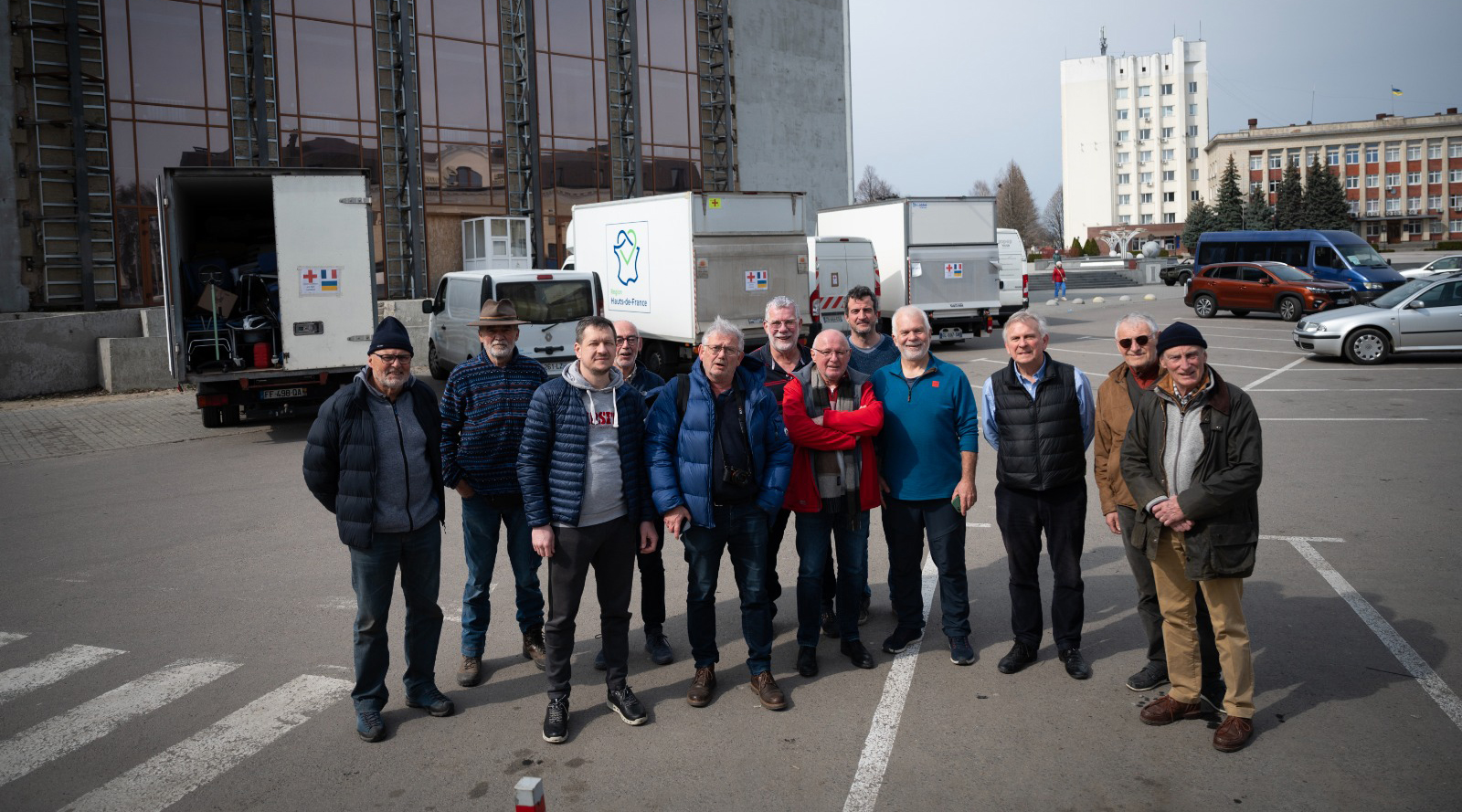
WE HAVE ALREADY SUPPLIED OVER 200 TONNES OF AID
- We started in early March. Since then we have been to Uman eight times. For the first two times we were alone in our van. The number of vans has continually increased and since the end of 2022, seven vans hit the road in convoy every time.
We’ve expanded our effort and now we have six different sites across France where our teams collect the goods from clinics and infirmaries. Our biggest donors are mainly hospitals. Of course, we also receive donations from average people. Our network has grown rather large.
In addition to the convoys, we have chartered four semi-trailers to transport the heaviest equipment. One of them departed from the south of France just a couple of weeks ago, loaded with tons of medical equipment.
Our cargo includes medicines, medical and paramedical equipment, as well as hygiene products, intended for a hospital in Uman and for internally displaced persons.
We've provided a lot of electric equipment as the Russians try to destroy your energy generation facilities. We brought in dozens of generators, especially for schools. We have offered laptops, tens of thousands of notebooks, binders, materials for manual work and drawing to around 20 schools and orphanages in Uman, but also in Zhytomyr and Chervinitsi, a total of 50 tons or so.
So we have already supplied over 200 tonnes of humanitarian aid in general but I can’t say how many million euros all of that is worth because we buy only specific items, like NATO tourniquets, while most of the equipment is donated without a price tag to it.
WHAT I SAW IN BUCHA AND BORODIANKA AFTER RUSSIANS PULLED BACK WAS PRETTY DRAMATIC
- And what were your deepest impressions since you launched your mission?
- Well, on our first deployment, we went to Bucha and Borodianka where I saw the devastation and met people who were somehow trying to put their lives back together after the Russian occupation troops withdrew from the area. That was pretty dramatic, and I still remember that.
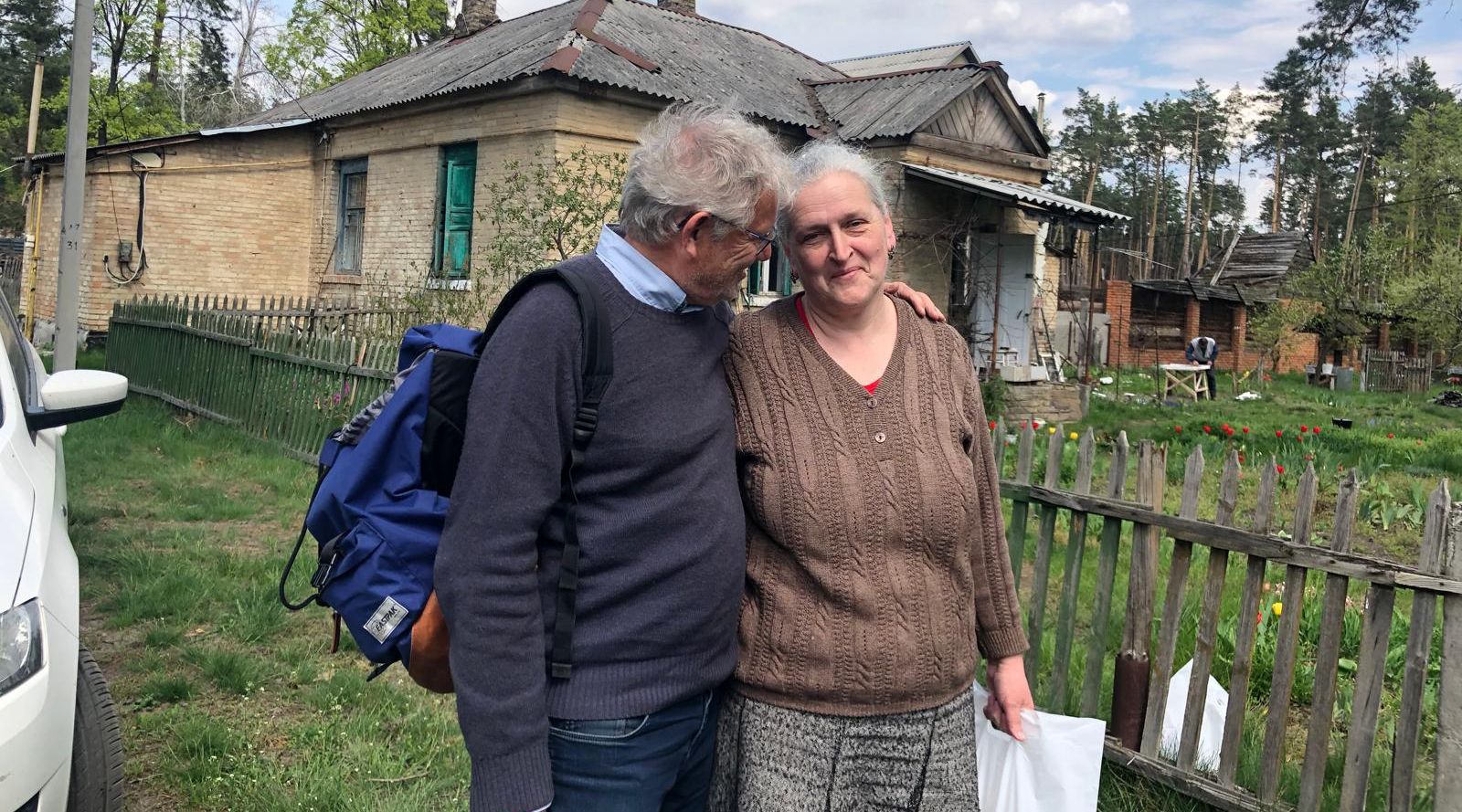
While in Ukraine I saw many amazing people, with remarkable stories related to this war. There’s of course Iryna Pletniova, Mayor of Uman, and hospital chief Oleksandr Maksytov, who has grown to become by good friend. He’s been doing a lot, truly a lot for his country, and he just never stops. He practically learned how to operate war wounds and injuries from scratch, from a textbook, after the big incursion started and loads of WIAs started coming in for surgeries. I’m also privileged to know Vadym and Olga, pharmacists who have devoted themselves to humanitarian aid since the start of the conflict.
Also, we are now traveling with a Ukrainian Staff Sergeant named Ihor, a native of Zhytomyr region. He was wounded in his right leg near Bakhmut so that leg had to be amputated. So we took him to France where he got a brand new prosthetic with electronic assistance.
We met many groups of veterans, war widows, and refugees. One of those meetings probably stands out. We encountered a former teacher Liudmyla, a Kherson woman in her senior years, who was forced to took refuge in Uman after her home was destroyed. Having initially planned to stay in an IDP shelter for two months, she had been there for 14 months by the time we met her. Despite losing everything, her mischievous eyes and mischievous words were a perfect illustration of the country's spirit of resilience.
She has two sons. With one of them, who is now in Germany, she’s in contact but not with the other one, who lives in Vladivostok, in the Russian Far East – a striking fracture common among families torn apart on both sides of the border since war-start. Some are subjected to bombardments and some firmly believe in Putin’s version of a “special military operation” intended to “liberate Ukrainians from a Nazi government”.
I ONCE INTERVIEWED YUSHCHENKO
- Could you recall how you came up with the idea to set up your operation and travel to Ukraine? Back then, you had already retired from your work in media. Do you remember what made your mind “click”?
- Yes, I’d worked for AFP. Throughout the years, I was a bureau chief in China, South Africa, Iran…. I also was the executive editor in Paris for four years. I retired five years ago and started to work in my garden.
As for that click, it was probably when I met my former colleague at a bar in Paris, who had just gone to Ukraine in a rental car to bring a few boxes of aid. I suggested that we form an association in order to help the victims of the war. A structure to supervise and facilitate the collection of financial and material assistance.
By the way, that guy spent more than a decade as a journalist in the Soviet sphere, worked in Russia. I, myself, also visited quite often both the USSR, traveled to Russia and Ukraine. I actually interviewed Viktor Yushchenko just when he came to power, so this goes way back.
And there’s another thing. When I was a journalist based in Johannesburg at the time of the Apartheid and the riots in the 1980s. I once visited a township of Alexandra where South African police were demolishing all shacks in the area. So there was this old lady sitting on her bag, and the police put her on a bus to send her to a Bantustan (an area set up for the purpose of concentrating the members of designated ethnic groups – ed.).
So that old lady asked me: “What are you going to do about it?” I told her I was going to write a story - and that story actually did quite well, going international. But she asked me, again, “What are you going to do?!” And then I realized that we might be doing a great job as journalists, that’s it's so very important for democracy, but sometimes you just have to act differently, including through humanitarian work. So in no way do I diminish the merit of journalism, it is huge, especially now here, in Ukraine. It’s critical that you have journalists on the ground, who sometimes get killed.
IN CHARITY SPHERE, PEOPLE TEND TO SHIFT FOCUS
- There has been a slight but steady decrease in public support across the European Union for the Ukraine cause. Do you see this support waning in your particular humanitarian association? Are donations on decline now?
- We are a relatively small actors in the field. We only started our work after the full-scale invasion, and we did it from scratch. But we do not have a feeling that there is a war fatigue among donors. Maybe that’s because we have the possibility to be in direct contact, as I've said, with hospital professionals, medical circles. As for average citizens, I wouldn't say it’s the lack of interest, but, indeed, declining interest. That’s including because of what happened a year ago, the Hamas attack on Israel. In a charity business, a lot of people tend to switch attention after another conflict emerges or some natural disaster hits. It’s a terrible thing to say but that’s just how it works. However, I would say there is still big support for Ukraine.
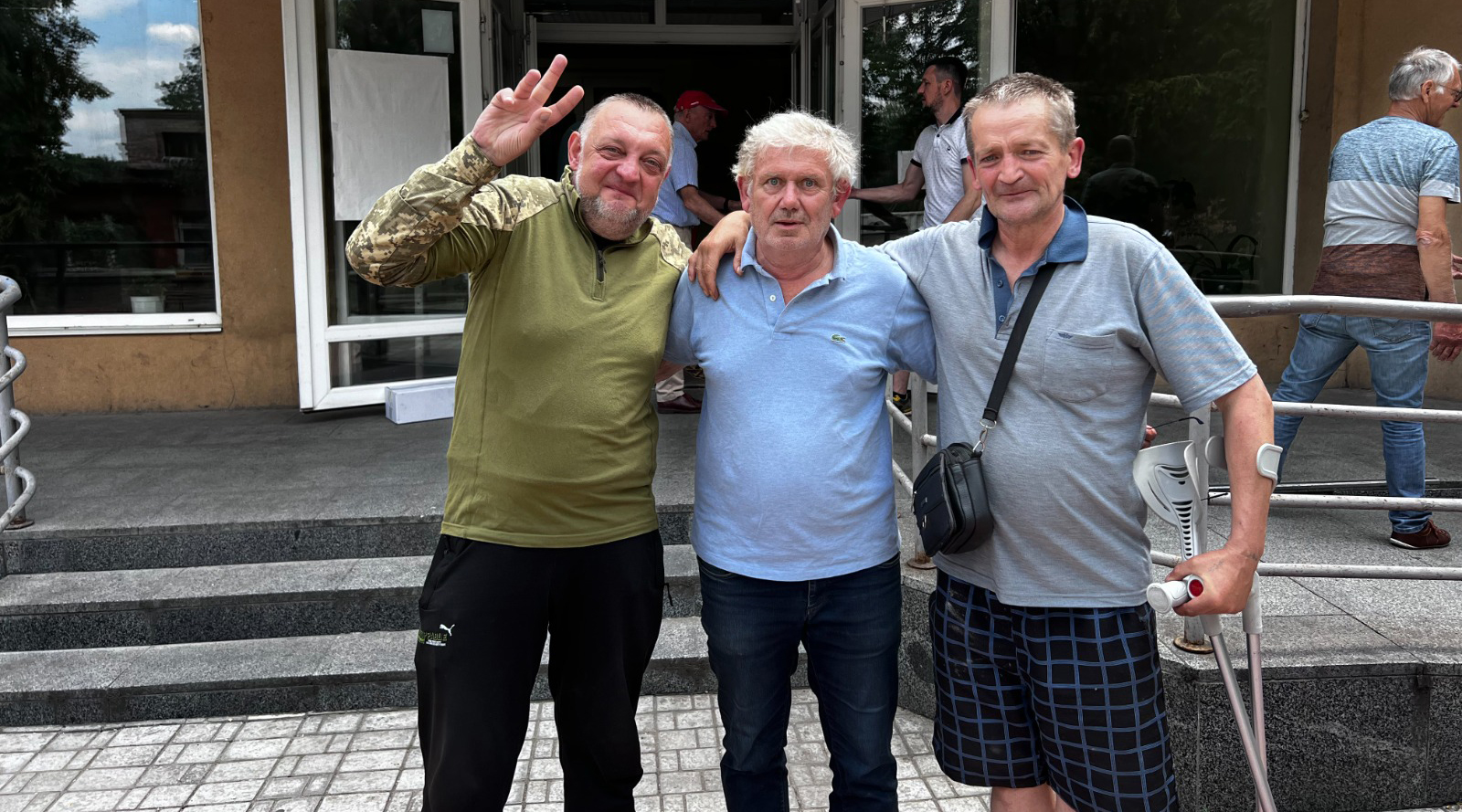
- You've been in the media business for a long time and you obviously follow domestic politics in France. How would you comment on the recent changes in the French government and the gradual rise of populists who always press on the pain points of the population, thus gaining votes without actually offering any concrete solutions to address problems? What can be done to keep the Ukraine agenda alive and not let those populists win people’s minds?
- It's a good question, and a difficult one. Indeed, I worked throughout my professional life in the media business. And, I have a feeling that the serious, responsible media are doing their job but people are now led in their decision-making by social media. I’m referring to Trump being elected, to Brexit, and so on. Those voters are misled by false promises Etc. Also, facts are not so important or relevant these days. It’s your convictions that are more important. If people are simply convicted that Trump is the best ruler for the U.S., they will cast their votes accordingly. I also things things now happening in France are also disturbing. So obviously, the outcome of the American election will have a big impact on the assistance provided by the leading donor to Ukraine.
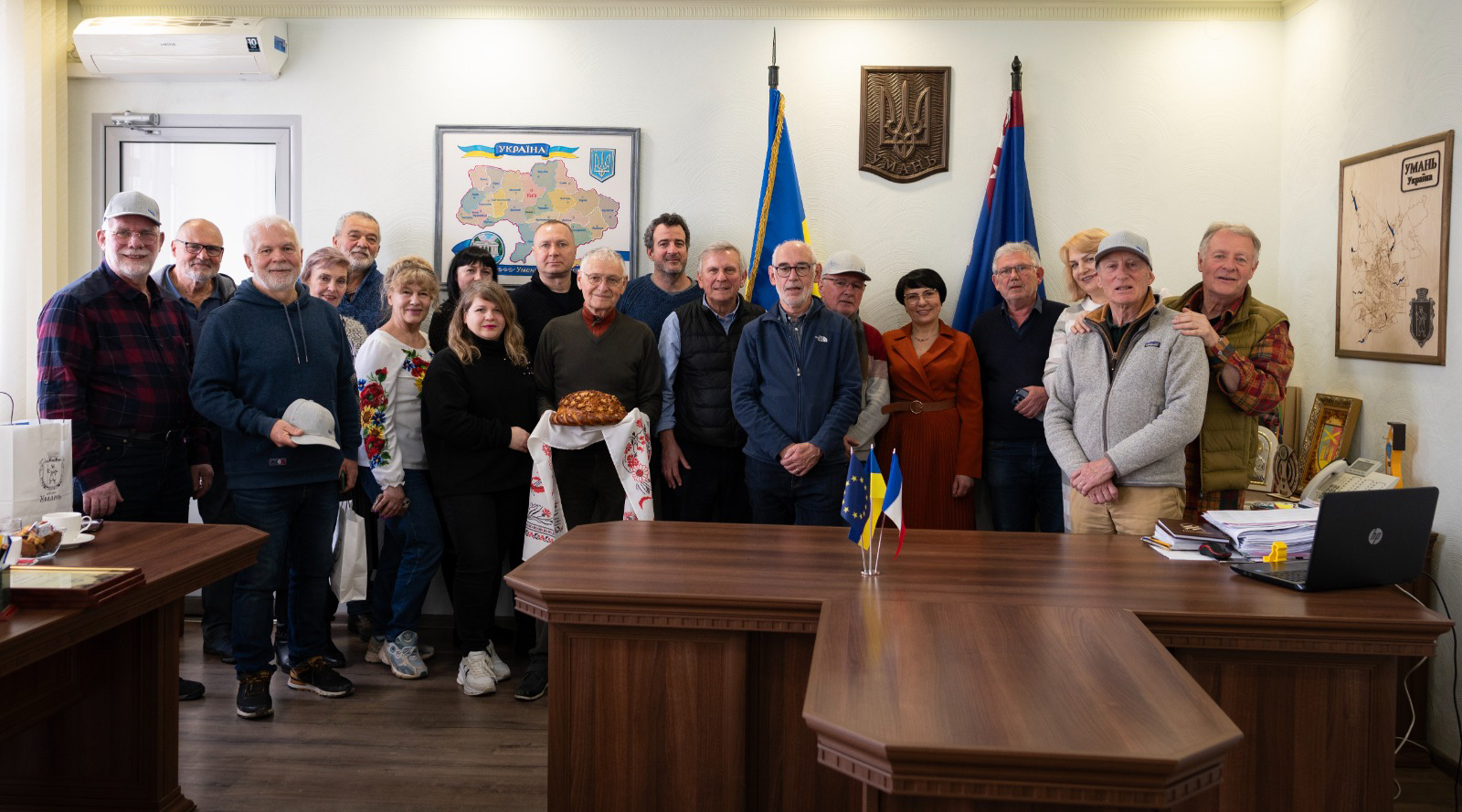
SOCIAL MEDIA INFLUENCE PEOPLE’S ATTITUDES TOWARD UKRAINE
- How bad is the influence on average people’s attitude toward the Ukraine cause streaming from social media platforms?
- I frankly don’t see a coordinated offensive against the effort to help Ukraine. But social media do have an effect on the level of attention or sympathy that people in different countries have for the Ukrainian cause. Driven by social media agenda, people start discussing things in at a dinner table, having that “kitchen talk”, like maybe we should negotiate things around to end the Russian war in Ukraine.
- What about people you get to meet in Ukraine? You’ve been here many times since the big invasion so do you see any shifts in people’s perceptions at to the terms of victory/settlement/concessions?
- It's difficult to say but in general terms, the spirit of resistance and patriotism is still strong. Many people are tired, of course, I can understand that. As we drive across Ukraine, all the way from the Polish border to Uman, we see cemeteries along the road, with so many Ukrainian flags flying over the graves. This is obvious that the war is taking its toll and that the war is already raging for too long. This time I felt immense weariness in view of the considerable losses caused by the war. To the point that many interlocutors broke a taboo by evoking the need for peace, even if it is accompanied by loss of territory.
This is the first time I have heard such views in eight trips. This resignation is expressed with sorrow, but the references to human waste and a “lost generation” weigh extremely heavily in the balance. I will devote my next column on our site to this painful observation.
IF A TRUCE COMES WITHOUT SECURITY GUARANTEES FOR SUSTAINABLE PEACE, RUSSIA WILL ATTACK AGAIN
- But what’s your gut feeling? If any sort of truce comes now, how long will it take for Russia to strengthen its force and attack again?
- Having worked so long in a news agency, I always try to refrain from betting. But when you know history, you see there was the Chechen war, then there was Georgia, then Crimea and Donbas… Nobody in the West really tried to resist those moves. So I feel that if there’s a truce that doesn’t provide security guarantees toward a real peace, Russia might go further and we will have another war in the region.
Some experts believe that with the Ukrainian Army having gained so much strength and experience in fighting off Russian aggression, NATO would actually benefit from having us in their ranks, given the looming Russian threat. What is your take on Ukraine’s NATO membership prospects?
I'm not sure my point of view is that relevant but I've heard statesmen and NATO officials saying that Ukraine is really welcome but lot of people have wondered whether the Alliance would take Ukraine aboard while you’re still at war – primarily due to Article 5 reservations, the musketeer principle of “one for all and all for one”. So they would rather have Ukraine once peace is secured.
From history, we know that the signatories to the Budapest memorandum also promised Ukraine that they will come to the rescue if the nation were ever to be subject to aggression. But it never happened in Crimea or Donbas.
- That issue with the wording there – assurances, not guarantees…
- Yes, but there still must be some red lines. When there was a warning from the West to Syria’s Assad that, if he ever resorted to the use of chemical weapons, this would be a red line prompting response. And what happened next? He did use those chemical weapons, and nothing happened…
Ievgen Matiushenko, Kyiv
Photos from Denis Hiault’s own archive
